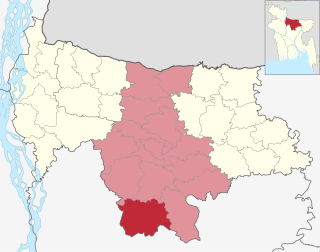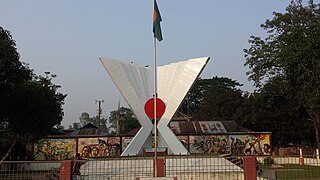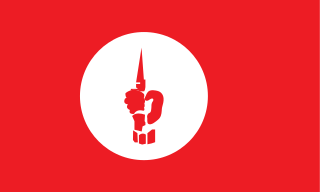Mohammad Ataul Gani Osmani was a Bangladeshi military officer and revolutionary. His military career spanned three decades, beginning with his service in the British Indian Army in 1939. He fought in the Burma Campaign during World War II, and after the partition of India in 1947, he joined the Pakistan Army and served in the East Bengal Regiment, retiring as a colonel in 1967. Osmani joined the Provisional Government of Bangladesh in 1971 as the commander-in-chief of the nascent Bangladesh Forces. Regarded as the founder of the Bangladesh Armed Forces, Osmani retired as the first full general from the Bangladesh Army in 1972.

Hemayet Uddin (BB), more widely known by his first name Hemayet, was a famous Bangladeshi militia leader and freedom fighter in the 1971 Liberation War of Bangladesh. For his valor, he was awarded the honor Bir Bikrom, a national award for gallantry and was conferred a military rank of Subedar after the war.
The Swadhin Bangla Biplobi Parishad was an armed underground student political group secretly organized in 1961 by Serajul Alam Khan, a key founder of Bangladesh, that worked to wage an armed secessionist struggle against Pakistani rule and achieve the independence of East Pakistan as "Bangladesh".
The Bangladesh Liberation War started on 26 March 1971 and ended on 16 December 1971. Some of the major events of the war are listed in the timeline below.

Mujibnagar, formerly known as Baidyanathtala (Boiddonathtola) and Bhoborpara, is a town in the Mujibnagar Upazila of Meherpur District in Khulna, Bangladesh. The Provisional Government of Bangladesh was formed on 10 April 1971, however, sworn in on 17 April 1971 in this place by the elected representatives of the Bengalees, that led the Bangladesh Liberation War, who were leading the guerrilla war for the independence of Bangladesh from Pakistan in 1971. The place was renamed Mujibnagar by the proclamation of independence, in honour of then imprisoned Sheikh Mujibur Rahman, who had declared Bangladesh independent. The actual capital of the government while in exile was Calcutta. A memorial complex covering 20.10 acres (8.13 ha) has been built at the site where the ministers of that first government took their oaths.

Bhaluka is an upazila of the Mymensingh District located in Bangladesh. It is one of the oldest small business hubs in the area.
Hemayet Bahini was a guerrilla militia force of Bangladesh in the Bangladesh Liberation War of 1971. This small force was known by the name of its leader and organizer Mohammad Hemayet Uddin Bir Bikrom.
The Mujib Bahini, also known as Bangladesh Liberation Force (BLF), was an armed force formed during the Bangladesh Liberation War to fight against Pakistan in 1971. The force was mainly composed of activists drawn from the Awami League and its student front, the Chhatra League. At its height, it had reportedly 10,000 members. It was organised with the active assistance of Major General Sujan Singh Uban of the Indian Army. Serajul Alam Khan and Sheikh Fazlul Haque Mani, Tofael Ahmed and Abdur Razzaq were the organizers of this force.
Kader Bahini was an independent militia created during the Bangladesh Liberation War of 1971, the other being Mukti Bahini. It was named after its leader, Kader Siddique.

The Battle of Kamalpur, launched against the Pakistan Army is one of the most significant military engagements fought by the Mukti Bahini in 1971 during its war of independence from Pakistan. The Pakistani Army set up a military camp at Kamalpur which was attacked by 1st East Bengal Regiment of Z Force several times. The first attack was made on June 12, and a second attack was made on July 31, 1971, also another attack at 22 October 1971 and in total, there were 18 battles in Kamalpur.

Ahmed Imtiaz Bulbul was a Bangladeshi lyricist, composer and music director, active since the late 1970s. He was a freedom fighter who joined the Bangladesh Liberation War at the age of 15. He won Ekushey Padak and Bangladesh National Film Award for Best Music Director twice for the films Premer Taj Mahal (2001) and Hajar Bachhor Dhore (2005).

The Mukti Bahini, also known as the Bangladesh Forces, was the guerrilla resistance movement consisting of the Bangladeshi military, paramilitary and civilians during the Bangladesh Liberation War that transformed East Pakistan into Bangladesh in 1971. They were initially called the Mukti Fauj.

Z Force, also known as the Tura Brigade, was the first military brigade of Bangladesh Forces, formed during the Liberation War of Bangladesh in 1971 under Major Ziaur Rahman along with the consent of the revolutionary government of Bangladesh in exile. The brigade was formed with the 1st, 3rd and 8th Battalion of East Bengal Regiment on 7 July 1971. It is the first ever complete brigade formed during the Liberation War of Bangladesh in 1971.

Abu Taher Mohammad Haider, Bir Uttom was a Bangladesh Army officer and recipient of Bir Uttom, the second highest military award in Bangladesh. He fought in the Bangladesh Liberation War as the second-in-command of the K force under Khaled Mosharraf. Later he became the sector commander of sector-2 from 22 September 1971. After the assassination of the President of Bangladesh, Sheikh Mujib in a military coup; he joined a counter coup led by his former commander Major General Khaled Mosharraf. He was killed in a situation marred with confusion along with Khaled Mosharraf on 7 November 1975 by proponents of a counter coup led by Colonel Abu Taher.

Muktijoddha Sangsad a non-political welfare association of the combatants during the Bangladesh Liberation War formed on 13 February 1972. The organisation has a football club, Muktijoddha Sangsad KC, named after itself.
Mohammad Ziauddin, BU is a retired Bangladeshi military officer, who was the Commanding Officer of the 1st East Bengal Regiment during the Bangladesh Liberation War. He was awarded the Bir Uttom, the country's second highest gallantry award for his outstanding bravery in the Liberation War. His certificate number was 22.
Akbar Bahini was a volunteer force during the Bangladesh War of Independence. Akbar Hossain Miah was the Chairman of Srikul Union in Sreepur PS of Magura District. Immediately after the outbreak of war in East Pakistan, Akbar Hossain devoted himself in organising a group of fighters. The majority of the members of Akbar Bahini were extracted from amongst the locals of Sreepur area, but also included members of the East Pakistan Rifles. Akbar Hossain Miah, formed a group of fighters called 'Akbar Bahini'. Akbar Hossain was the commander, and Mollah Nabuwat Ali was its deputy commander.
Latif Bahini was a militia during the Bangladesh War of Independence. Abdul Latif Mirza was a member in the Bangladesh Forces. He planned to build a force in Vodroghat village under Kamarkhand Police Station in Sirajganj District, Rajshahi Division.

The 1968–1971 East Pakistan communist insurgency was an armed conflict between several communist groups and the Pakistani government for the independence of East Pakistan, it was also later part of the Bangladesh Liberation War in 1971.









